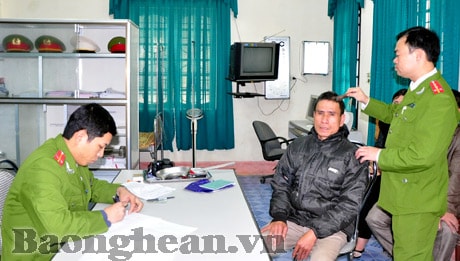Forensic assessment: Need for synchronous coordination
(Baonghean)-In order to serve the investigation and inspection work, and resolve complaints and denunciations, recently, judicial appraisal activities in the province have received attention from departments and branches and achieved certain results. However, current judicial appraisal activities compared to actual needs still have many limitations...
Currently, Nghe An has 3 centers performing forensic examination activities: Forensic Examination Center, Forensic Psychiatric Examination Center (Department of Health) and Criminal Technique Department (Provincial Police). With 96 examiners, in 2011 and the first 5 months of 2012, the centers performed examinations on over 3,000 cases, of which 2,779 were criminal technique examinations and 240 were autopsy examinations.
An injury assessment at the Criminal Investigation Department of the Provincial Police.
In addition, they also assess injuries, rape, and health for Vietnamese people who marry foreigners. In general, the forensic assessment activities of forensic assessment organizations have met the requirements for assessment requests from prosecution agencies, serving investigation, prosecution, trial, and resolution of cases at all levels. The assessment results ensure objectivity and accuracy, and there are no complaints, denunciations, or cancellations of assessment results by assessors. The number of cases requiring re-assessment is only isolated.
Among the cases requiring forensic examination, the most are criminal technical examinations, focusing mostly on drug examinations, fake seals, and stamped machine numbers, carried out at the Criminal Technical Examination Department of the Provincial Police. "However, there are still examinations that do not allow technical equipment and human resources, so we still have to hire examination centers in Hanoi to perform at a high cost," said Colonel Nguyen Huu Cau, Deputy Director of the Provincial Police. For example, a batch of illegal timber to determine the age and quality of the wood, etc., the relevant agency, the Provincial Forest Protection Department, cannot perform. To conduct the examination, the Department must send it to the Ministry of Agriculture and Rural Development with an average fee of 1m3/1.8 million VND. Or to determine fake alcohol, the examiners must go directly to the factories to ask for examination, but in many cases the factories do not cooperate. In addition to the limitation of technical equipment, the main reason is that the province has not paid much attention to training appraisers in departments and branches. Therefore, many specialized fields such as finance, science and technology, culture, sports and tourism, construction, industry and trade, transportation, etc., although appraisers have been appointed, their capabilities have not been fully utilized. Currently, since the appointment until now (2006), only 1 case has had the support of a judicial appraiser at the Department of Finance, and other departments and branches have not requested any case appraisal.
In addition to the lack of human resources and facilities, the unsatisfactory treatment policy is also a limitation that makes it difficult to attract human resources in this industry. An appraiser of the Department of Health said: The profession of appraisers often comes into contact with corpses and toxic environments, but currently there is no appropriate policy mechanism and treatment regime. Therefore, it is very difficult to attract doctors who meet the professional requirements to become appraisers. If we take nurses to study to become doctors, the quantity will be sufficient but the quality will not be guaranteed.
Faced with the above limitations, in order to effectively implement the Project "Innovation and improvement of the effectiveness of judicial appraisal activities in Nghe An", in the coming time, the province still has a lot of work to do. That is, to consolidate the material facilities, review, statistically evaluate the capacity and ability to meet the appraisal requirements of the team of judicial appraisers managed by the sector to supplement the force of appraisers, gradually rejuvenate the force of judicial appraisers with high professional qualifications. Along with that, it is necessary to soon build a coordination regulation between the centers and departments, branches and sectors to remove difficulties in the appraisal force, material facilities, and policies in the current judicial appraisal work.
Song Hoang






